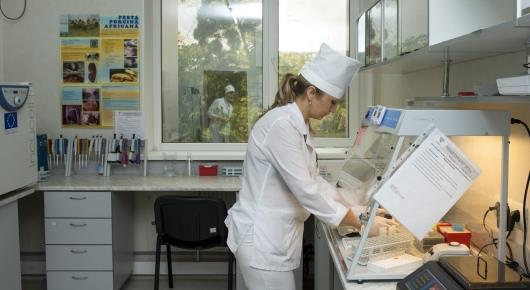Moldova authorities learn the latest on coping with Salmonella, Campylobacter

Food safety and public health authorities in Moldova continue to upgrade their ability to protect consumers from food safety hazards. At a workshop taking place here today, Salmonella and Campylobacter were in the focus, along with the evolution of drug resistance in these bacteria – in some foods and in humans.
The workshop is organized by FAO – in close collaboration with Moldova’s National Centre for Public Health and National Food Safety Agency. Participants include the heads of national and district level public health centers with performance laboratories, representatives of the National Food Safety Agency, Ministry of Agriculture, Regional Development and Environment, Ministry of Health, State University of Medicine and Pharmacy, and the National Centre for Veterinary Diagnostics. Assistant FAO Representative Tudor Robu addressed participants at the opening.
The workshop is part of a two-year project conceptualized, financed and implemented with FAO technical and operational support. The project’s major objectives are to protect the domestic food market and enhance Moldova’s ability to export foods to key high-value international markets. Due to conclude in late March 2018, the project is benefitting consumers, policy makers, competent national authorities, producers, processors and food service businesses.
“The value of this workshop is in drawing public attention to the ‘One Health’ concept which reminds that human and veterinary public health are in many cases interconnected,” said FAO food safety and nutrition officer Eleonora Dupouy.
“A special focus of the workshop is raising awareness about antimicrobial resistance,” she added. “Antimicrobial resistance should be tackled from both public health and food chain perspectives with due importance to national analytical detection capabilities.”
Along with updates on the antimicrobial resistance problem, the workshop provides a capacity-development opportunity with leading national specialists sharing the validated international protocols and challenges in detection and monitoring of Salmonella and Campylobacter – two pathogens that are among the top causes of foodborne diseases. The experts will explain how to isolate, identify and interpret results in Moldova’s food safety laboratories.
“We expect that this workshop will have also a regulatory impact in antimicrobial resistance area,” Dupouy said.
Today’s training encourages participants to use Codex Alimentarius guidelines for the control of Campylobacter and Salmonella in chicken meat. Also under discussion is the National Strategy on Antimicrobial Resistance, including roles and responsibilities for putting the Strategy into action.
27 February 2018, Chisinau, Moldova
